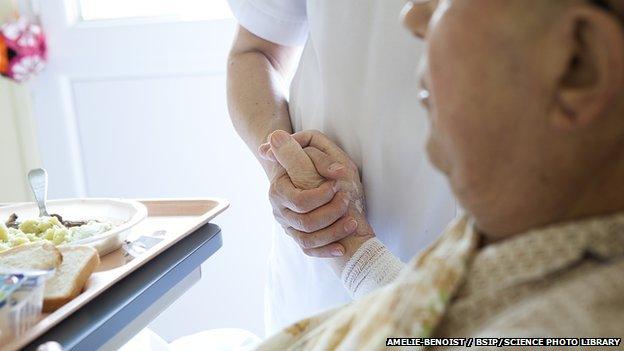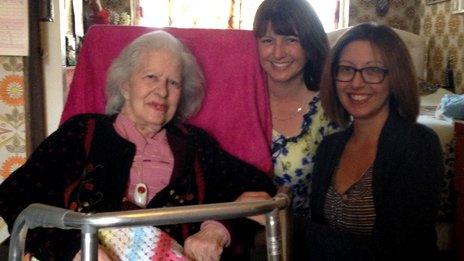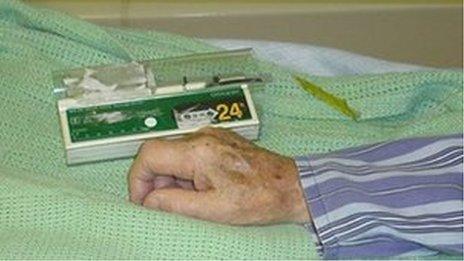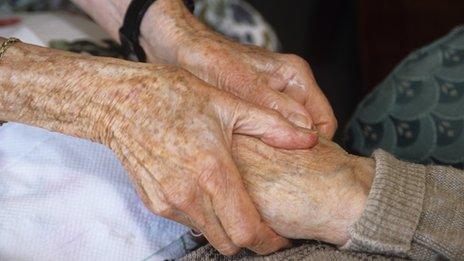Dying care: 'Improved' guidelines proposed
- Published

England's health watchdog has put forward new draft guidance to improve the care of adults in their last few days of life.
It comes after concerns that misuse of the previous system - the Liverpool Care Pathway - led to some patients being deprived of water and food.
The guidelines encourage staff to involve patients and relatives in decisions and to communicate well.
The Department of Health and charities welcomed the move.
'Tick-box care'
The Liverpool Care Pathway was introduced in the late 1990s, in an attempt to ensure people had a dignified and comfortable death.
It involved a checklist to ensure patients were free from invasive procedures and medications that were no longer necessary.
But it faced increasing opposition, with some describing it as a "tick-box exercise".
And an independent review found some patients had been left thirsty and decisions sometimes taken by inexperienced staff.
While the National Institute for Health and Care Excellence acknowledges many failings were down to how the pathway was implemented - rather than a direct consequence of the document itself - the new draft proposals are designed to address these problems.
The wide-ranging guidance intended for patients, relatives, hospitals, hospices and others involved in end-of-life care is open for public review until September 2015.
It focuses on providing personalised care, good communication and shared decisions between staff, relatives and patients when appropriate.
Staff are advised to undertake daily reviews of medication and check if people are thirsty or need more nutrition.
NICE also says people important to the dying person should be encouraged to help with giving drinks if they wish.
According to the guidelines patients must be monitored for any improvements and if there is any uncertainty staff should seek help from more experienced colleagues.
Dignity
Tony Bonser was involved in reviewing the Liverpool Care Pathway and campaigns for better end-of -life care. His son died at the age of 35 from a rare cancer.
He told the BBC: "The problems arose because of a lack of communication. We as his parents didn't know what was going on.
"No one was telling us that he was terminally ill and the word dying was never used.
"Towards the end of his life we were totally unaware that death was approaching and so when it did happen it was a shock."
Prof Rob George, president of the Association of Palliative Medicine, says the concerns with the Liverpool Care Pathway were a wake up call to change the system.
He told the BBC: "The problem in a sense with an industrialised approach to managing dying people is that everyone gets preoccupied with ticking the boxes and not looking at the person in front of them.
"Let's not forget we are dealing with people who are dying and who are distressed and actually bedside assessment, communication - the milk of human kindness - is what matters.
"It is often difficult in a modern health service with the pressures on staff - almost a compassion fatigue that sometimes people have engaging with those individual needs."
The charity, the National Council for Palliative Care, says it supports the strong focus on personalised care in the draft guidelines.
'Everybody's business'
Claire Henry, chief executive, said: "It is not a tick-box exercise that someone just has to follow. It focuses on individual needs.
"People need to have meaningful choice and be involved in decisions about their end-of-life care, allowing them to maintain comfort and dignity until they die."
However, she added that health and care staff needed to be provided with ongoing training "as end-of-life care is everybody's business and there is only one chance to get it right".
Prof Bee Wee, at NHS England, said: "We want to ensure that people who are dying receive the best possible care, including effective communication between them, their loved ones and the professionals looking after them.
"This draft guidance is therefore welcome, and I would encourage members of the public and professionals alike to contribute to the consultation."
- Published6 October 2015

- Published15 August 2013

- Published13 July 2013

- Published27 January 2014
